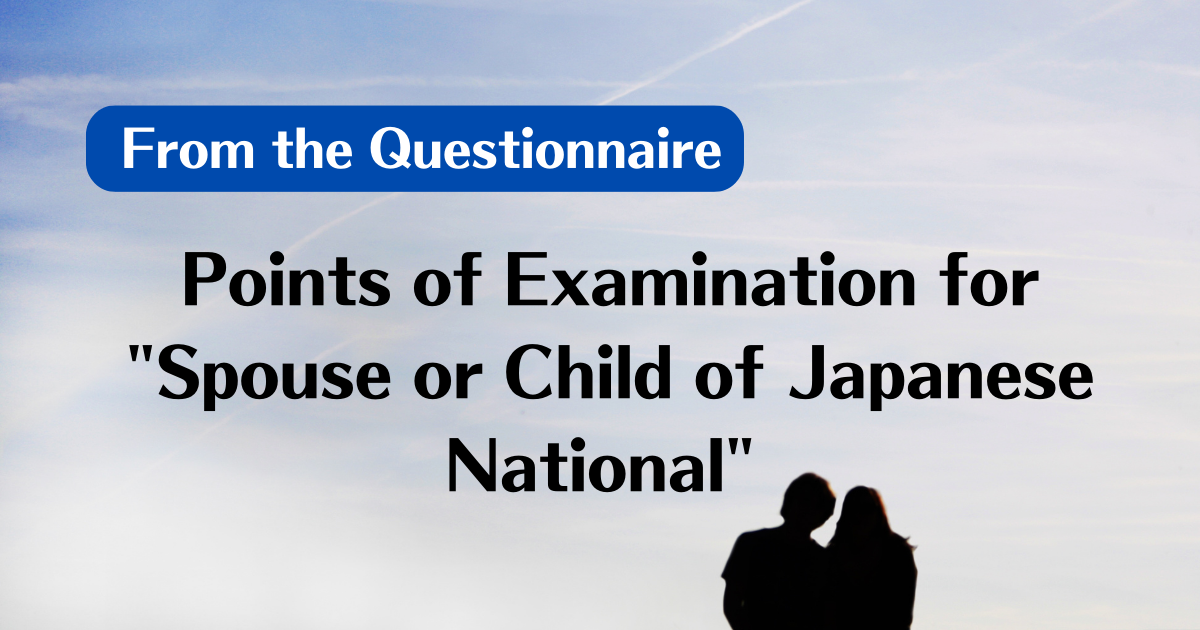
If you are married to a Japanese national and wish to live in Japan as a spouse (husband or wife), you must obtain a “Spouse or Child of Japanese National” status of residence (visa) to be able to stay in Japan. In order to be granted this status of residence (visa), you must be able to lead a stable life in Japan. However, the specific criteria for annual income are not clear. The following is an explanation of the conditions under which a “Spouse or Child of a Japanese National” will be granted.
Examination Points for “Spouse or Child of Japanese National” Status of Residence

For the status of residence (visa) of “Spouse or Child of Japanese National”, the examination will focus on two major themes: “whether the marriage relationship is a true one” and “whether the married life is one of mutual assistance and support under cohabitation”. There are many other detailed themes, but in this part, we will explain about ” the married life is one of mutual help and support under cohabitation”.
Point (1): The marriage relationship must be true.
In the case of a “Spouse or Child of Japanese National“, the marriage must be true.
An “untrue marriage” is a marriage solely for the purpose of obtaining a visa, a sham marriage that is not actually a marriage, or a marriage that is in effect divorced but is continued for visa purposes only.
Compared to a work visa, ” Spouse or Child of Japanese National ” has more relaxed requirements for permanent residence or naturalization, and there are no restrictions on employment, making it an “easy-to-use” status of residence. For this reason, it is easy to be abused, and the Immigration Service Agency is paying special attention to “sham marriages”.
For the above reasons, when applying for “Spouse or Child of Japanese National”, the applicant must write in detail the circumstances of meeting, dating, and marriage in a fixed format called a “Questionnaire”, and appeal that it is a “true marriage”.
Point 2: Married life must be one of mutual help and support under cohabitation.
Whether it is the foreign national’s own, the spouse’s (wife/husband), or both (total), the basic rule is that the income must be sufficient to live on.
In the case of “Spouse or Child of Japanese National” status, there is no clear “annual income requirement” because the income required for a household will vary depending on the composition of the family and whether or not they sends money to the home country. No matter what your family structure is, you need to prove that you can lead a stable life in Japan. Basically, there is no problem as long as the couple can live without incurring a monthly deficit based on their income (household income) and assets.
However, there is a possibility that the situation may become unstable temporarily at times of major life changes, such as when a couple moves their base of living to Japan. In such cases, it is necessary to demonstrate from various angles that there are no problems in living in Japan. The next chapter will explain what kind of cases there are.
Explanation by Case – How to Explain Income

One of the key points for permission is to have a stable “livelihood”, but the foreign spouse’s regular job is not the only thing to be evaluated. Basically, the premise is that “the couple must help each other to make a living”, so it is sufficient if the “household income” is stable. If it is not enough at the time of entry, but the couple can expect savings or support from relatives, they may be granted permission by proving this.
In cases where the couple is unemployed at the time of entry, but has a job offer from a Japanese company.
For example, if a couple is moving their base of living together to Japan, in other words, if they are changing jobs across the border, even if they have no income at the time of entry, there is generally no problem if they have a contract of employment with a company and have received a job offer.Submitting an employment contract to the Immigration Service Agency will be an appeal that you can lead a stable life.
The same is true if you are already living in Japan and are changing your visa status in order to change jobs. If you have already found a job and expect to earn enough money, there is no problem.
If both are unemployed at the time of entry into Japan, but will seek employment after arrival in Japan
Unlike the above case, if the couple has not found a new job at the time of entry to Japan and they can expect to receive money from relatives or have enough money for immediate living expenses, there is a possibility that the visa will be approved.A common case is to live with a Japanese relative at the time of entry until life becomes stable, have the relative cover living expenses during this time, and then become self-supporting, which is possible if the relative has a stable job and income.
If you have assets (real estate and savings) and want to live a slow retirement.
This is often the case for former Japanese nationals, for example. Those who were born in Japan, immigrated abroad, and acquired foreign nationality often reside in Japan with the status of “spouse or child of Japanese national” (visa) when living in Japan again.
In this case, those who choose Japan as a place to live after retirement may be permitted if they have enough savings, real estate, or other assets to support themselves in the future, even if they do not find a job.
In the case of business managers
In the case of a business manager, “director’s remuneration” is considered as income. In the case of a self employment, the “income amount” on your tax return is considered income. If the director’s remuneration is extremely low in order to save taxes or to make the company’s performance look good, it will be considered as “low income” no matter how good the company’s performance is.
In the case of a self employment, note that if the “income amount” is low as a result of recording various expenses (within legal limits), even if there is no problem in actual living, the “income amount” after deducting expenses from sales will be considered as income.
If you have multiple sources of income (e.g., main job, side job, real estate income, stock trading, etc.), these will still not be considered “income” by the Immigration Service Agency if you do not file a tax return correctly. Since “Tax Return(確定申告)” is a Japanese rule, if you do not file a tax return, you may be considered to have not paid your taxes correctly.
[Note on renewal] Not paying taxes is an appeal for not living.
For “Spouse or Child of Japanese National”, the required documents include a ” taxation certificate of residence tax(住民税の課税証明書) and tax payment certificate(納税証明書).
The main purpose of these documents is to confirm the income of the supporter, but of course the “tax payment status” will also be checked. Failure to pay taxes not only means that you are not living a serious life in Japan (failure to fulfill tax obligations), but also means that you are appealing that you “do not have money to pay taxes”.
If your life is unstable, you will not be granted the status of residence (visa) of “spouse or child of Japanese national”, and even if you are granted one, it is highly likely that its duration will be “one year”. Please be careful.
Conclusion

As mentioned above, there is no annual income standard required to obtain a “Spouse or Child of Japanese National” permit, but it is necessary to be able to expect to lead a stable life in Japan. For this purpose, other than employment, the status of savings and property (real estate, etc.), as well as remittances from relatives, may be accepted. It is necessary to provide a good explanation to prove that you have a stable life outside of regular employment.
In addition, in the case of a business managers, the amount of director’s remuneration and the income amount of tax returns is considered as “income”. Therefore, low income due to excessive tax reduction is likely to receive a low evaluation, even if the tax reduction is within the legal range.



